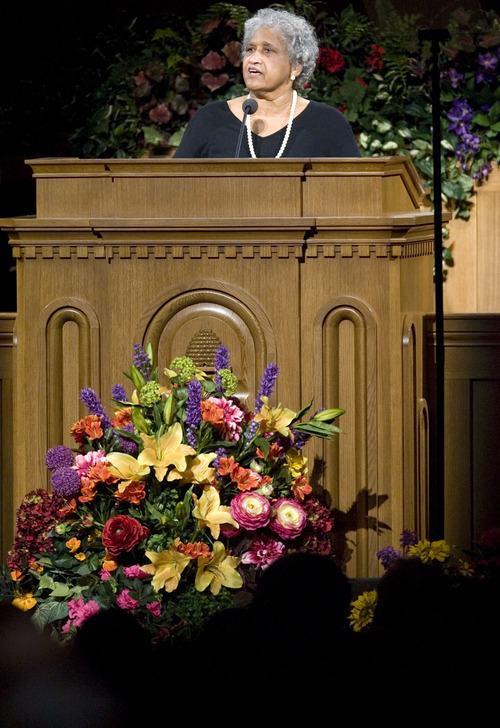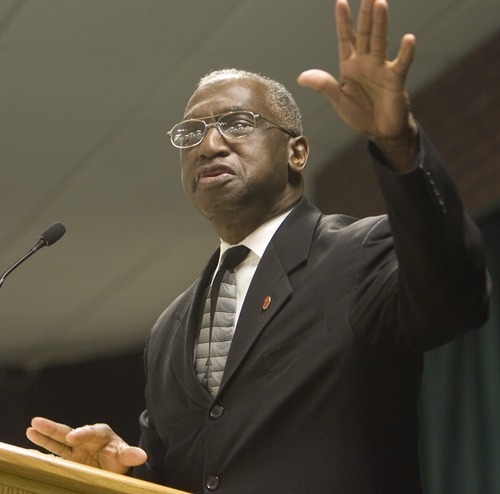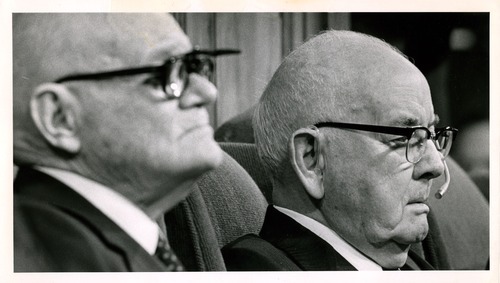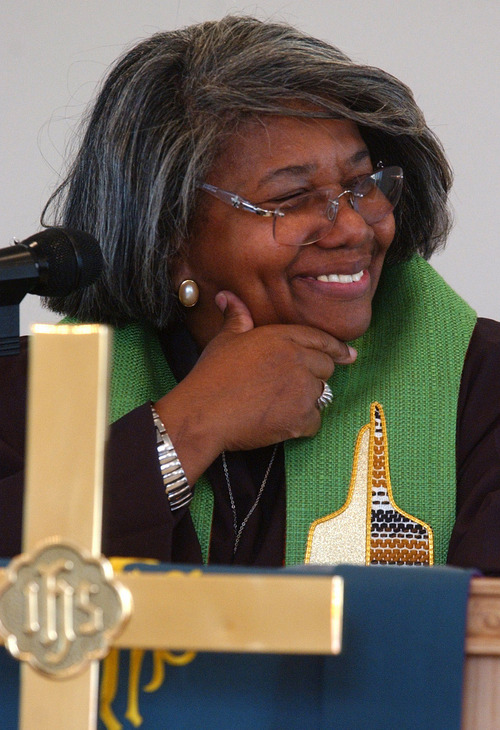This is an archived article that was published on sltrib.com in 2012, and information in the article may be outdated. It is provided only for personal research purposes and may not be reprinted.
Twenty years ago, who would have predicted the 2012 U.S. presidential race would pit a black incumbent against a white Mormon?
Barack Obama vs. Mitt Romney. The matchup is both thrilling and complicated for one particular group — black Latter-day Saints.
"I've been black my whole life and a Mormon for 30 years and never thought either of these [candidacies] would happen in my lifetime," says Utah attorney Keith Hamilton. "This is a day that all Americans should take some solace in — that things are changing. Regardless of who wins, this sends a message to our children."
Darius Gray, former head of Genesis, a long-standing support group for black Mormons, sees this historic choice between two members of traditionally outsider groups as evidence of a "marked change for this nation, a maturing too long in coming. You can take joy that both groups are now players on the scene."
Unlike white Mormons, the vast majority of whom side with Republicans, African-Americans overwhelmingly vote Democratic. So black Mormons look at Obama, the Democrat, and Romney, the Republican, and find themselves caught between political perspectives: Many still lean liberal, others have switched parties after joining the church, and some find themselves going back and forth.
Not so long ago, there were very few black Mormons even to consider.
Until 1978, The Church of Jesus Christ of Latter-day Saints barred blacks from its all-male priesthood. After that landmark shift 34 years ago this month, missionaries found some success winning black converts, but African-Americans still represent only about 3 percent of the Utah-based faith's 6 million U.S. members.
Of course, few people cast their votes primarily on the basis of race or religion. But many weigh whether a candidate's personal story, politics and perspective match their own.
"Having President Obama in the White House has done so much for race relations, which anyone who knows me is aware that this is one of my greatest passions," says Marvin Perkins, LDS co-author of the "Blacks in the Scriptures" DVD series. "In the last election, I voted for Obama, not because he was African-American but because he was clearly the better candidate."
Today, Perkins is not so sure that remains true, particularly in light of Obama's recent support of same-sex marriage, which his LDS Church opposes. Now that there's a Mormon candidate, Perkins likely will go the other way — not because of Romney's Mormonism, he writes in an email from Los Angeles, but because they share the same values.
—
Finding common ground • Not every black Mormon connects with Romney — or Obama, for that matter.
Hamilton, who explored reasons for the LDS Church's pre-1978 ban in his memoir, Last Laborer, says he cannot relate to either man's biography.
"Like Obama, I am an African-American and an attorney, but he lived a life very different than mine," Hamilton says. "As a Mormon, I don't have anything in common with Mitt Romney, except we both try to live our beliefs."
Romney is a multimillionaire with several homes, he says. "I don't know how Mormons like that live. I don't know what they do for service projects."
Hamilton voted for Obama before and likely will again — despite the president's position on same-sex marriage.
"I agree with the LDS Church's position that marriage is ordained between a man and a woman, but it is not my business who gets married under man's law," he says. "Same-sex couples are entitled to all the rights and privileges that America gives to anyone."
The way some people, including Mormons, speak about gays today, Hamilton says, "is the same way they talked about blacks 20 years ago. We went too far trying to explain the black issue, and we are doing the same thing with gays now."
Rob Foster, the first black student-body president at LDS Church-owned Brigham Young University, also rejects single-issue — or identity — voting.
"I try not to look at race as a No. 1 factor. It really has nothing to do with my politics," says Foster, now an eye doctor near Raleigh, N.C., and an elders quorum president in his LDS congregation. "I am a registered independent. I try to look at both sides of the issue and make a decision accordingly."
He, too, has similarities and differences with the candidates.
"Brother Romney, he's a BYU grad, LDS, temple-endowed member. But my social views are probably different from his, due to my personal experience," Foster says in a phone interview. "With President Obama, we might have similarities when it comes to things socially, but we can be different in other areas."
Foster will base his vote on policy, chiefly health care.
"I don't think if Brother Romney were elected president, there would be a huge difference," he says. "In either case, I don't see our country being united by our top-level leaders."
For Brazilian-born Marcus Martins, a main issue is jobs.
Martins was one of the first black Mormons to be called on a mission after the 1978 announcement. His father, Helvecio Martins, who died in 2005, became the faith's first black general authority.
Marcus Martins later moved to the United States, where he eventually taught at BYU-Hawaii. Last year he was called to serve as mission president of the São Paulo, Brazil, North Mission (the same one he served as a young man).
"What comes to my mind, as a voter, is my youngest son (age 24) who is part of a generation of intelligent, college-educated kids who can't find a good full-time job," Martins writes in an email from São Paulo. "So, as significant as it may still be in our society, race for me is out, and economics is now center stage."
The country's many issues are urgent and complex, he says, and he hasn't decided who will get his vote.
—
The women's perspective • Mia Love, a black Mormon and conservative Republican, is running against Democrat Jim Matheson in the newly formed 4th Congressional District. She has built her campaign on right-tilting principles and recently was endorsed by Romney's son Josh Romney.
Many other Mormon black women back Obama.
"I'm sure that a lot of people would expect that I would vote for Mitt Romney," says Audia Wells, a human-resources consultant with a master's degree from BYU and a member of the Atlanta LDS Ward, "but I voted for Obama in the previous election and will again."
She supports Democratic planks in boosting social services and working-class Americans and wants a president who will address the needs of "people who look like me."
Many members of her diverse Atlanta ward support Romney, she says, but a "surprising number" of whites "are going the other way."
Another Atlanta ward member, Bryndis Roberts, joined the LDS Church in 2008, but didn't convert her politics. Roberts is a lifelong Democrat who has never voted for a Republican.
As the second counselor in the ward's female Relief Society, Roberts doesn't bring her political views to church. But they are hardly secret.
"There's not any room on my car for another Obama sticker," she quips in a phone interview.
In fact, the ward is pretty evenly split between whites and blacks, and between Democrats and Republicans, the 55-year-old lawyer says. "When I go to [LDS] stake functions and the demographic changes, it seems to me that my political views are in the minority."
It makes her heart "overflow with pride and amazement to see an African-American in the Oval Office," Roberts says. "I am old enough to remember segregated bathrooms in Georgia, and bringing food and water on cross-state trips because we didn't know if we would be served in restaurants."
She didn't vote for Obama because of his race. In the 2008 primaries, she went for Hillary Clinton.
So did Catherine Stokes, a longtime Mormon convert and former public-health professional who retired to Salt Lake City in 2006.
Stokes, who joined the LDS Church in Chicago, was reared as a Republican. She switched parties in Utah because "Republicans here are so far out, a little over the edge in my mind."
She is not voting for Romney, but doesn't think he should be bashed for his faith.
"I can think of many reasons not to vote for Mr. Romney," Stokes says, "but his religion is not one of them."
Jerri A. Harwell, a Utah author and an assistant professor at Salt Lake Community College, also prefers women candidates.
"I have almost always voted for a woman candidate," she says, "[simply] because she was a woman."
Other than that, she says, she goes with Martin Luther King's "I Have a Dream" sentiment: Judge candidates "not by the color of their skin but by the content of their character."
Though Harwell, who describes herself as an "active, temple-recommend-holding Latter-day Saint," respects Romney as a Mormon, she worries he might be too used to taking charge as he did as an LDS bishop or stake president and having everyone fall in line behind his pronouncements.
"It doesn't work that way in politics," she says. "I hope he realizes that."
And she is not troubled by Obama's support of same-sex marriage.
"Good for him," Harwell says. "You can't tell me that God loves gays any less than anyone else."
—
Whose values? • Kenyan Amram Musungu is an LDS convert who has served in many LDS leadership positions, including as the branch president of the first LDS Swahili Branch in Salt Lake City. He also sings in the Mormon Tabernacle Choir and teaches Swahili at BYU. Though he has lived in Utah for 12 years, this will be Musungu's first election as a U.S. citizen, and he is carefully weighing his choice.
"They are both well-educated, both good guys, good family men, good leaders — and Obama's father is a Kenyan," Musungu says. "But my first vote will be for someone who shares my family values: Mitt Romney."
Meanwhile, Perkins still has some issues with the Mormon candidate.
Though the candidate's late father, George Romney — himself a former GOP presidential hopeful — incurred disapproval from some LDS leaders by supporting the civil-rights movement, Mitt Romney "has tended to keep a distance from African-American issues," Perkins writes.
That strategy, he suspects, stems partly from the "obvious questions and challenges" surrounding the LDS Church's history with blacks, but he would like the candidate to reach out more to the African-American community.
"[Mitt Romney] may indeed be different and more in line with his family's past efforts," Perkins says, "but I've seen nothing from Romney at this point that would demonstrate that he would be any different."
Still, that won't stop Perkins from voting for Romney.
"There is a special feeling that will go along with casting my vote for a fellow member of my faith," he says, "because he is the best candidate."
That's the real test, not race or religion, facing black Mormons and all other voters on Election Day.
Facebook.com/religiongal
Twitter: @religiongal









